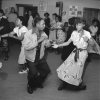Film
Fellini!
One of the world's greatest filmmakers, the late Frederico Fellini began his cinematic career collaborating with the neo-realist Rossellini. Fellini moved from poetic echoes of the neo-realism of his early films such as La Strada, Il Bidone and Nights of Cabria to explore the fluidly indulgent, fantastical vision of his mature work. This short series will present six of Fellini's masterpieces from the later period - where the whimsical, grotesque and absurd predominated, and from which the appellation "Fellini-esque" gained currency.
23 January - Juliet of the Spirits
Italy, 1965, 146 minutes
With his wife Giulietta Masina in the title role, Fellini concocts an opulent, erotic story of a woman who is driven to distraction over her husband's philanderings. Fellini's first film in colour, Juliet of the Spirits revels in hallucinatory imagery and visual splendour.
30 January - Amarcord
Italy, 1974, 127 minutes
The Academy Award winning Amarcord is perhaps Fellini's gentlest latter-day film. Based on his own memories of a provincial life under Fascist rule, Amarcord is full of lush and unforgettable images punctuated by hilarious burlesque sequences, rank melodrama, and fullsome political satire.
20 March - 8 1/2
Italy, 1963, 138 minutes
Fellini's self-referential masterpiece is about a director (played to perfection by Marcello Mastroianni) who can't quite get his film started despite the best efforts of his wife, various mistresses, co-writers, producers, set-builders, actors and a multitude of hangers-on. Funny, dreamlike and very existential, 8 1/2 is one of the great achievements of the European Cinema.
27 March - Fellini: A Director's Notebook
Italy/USA, 1969, 60 minutes
A self-portrait made for the unsuspecting US tv network NBC, this film catches Fellini wandering about the sets of the failed film The Voyage of the G. Mastorno. As preparations for Satyricon commence, Fellini films and unforgettable series of auditions and admits that he needs his freaks as much as they need him.
3 April - Satyricon
Italy, 1969, 138 minutes
Petronius' Roman-era satirical text now exists only in fragments, and Fellini uses it to explore "an utterly alien world awaiting salvation". Some might claim that Satyricon is a realistic view of ancient Rome in its decadence. Whatever the historical accuracy, it is a visionary film without peer: sumptuous, homoerotic, brutal, bizzare. Viewer discretion is advised.
10 April - Roma
Italy, 1972, 128 minutes
Fellini's most autobiographical film, Roma is a portrait of the Eternal City, imaginatively, geographically, historically and emotionally. With Fellini himself as a guide, we visit the catacombs, a Vatican fashion show, and many other landmarks that reveal much of Fellini's own daily inspirations.




